 | TODAY IN SCIENCE HISTORY NEWSLETTER - 23 JULY |
| Feature for Today |
| |
| Book of the Day | |
| |
| Quotations for Today | |
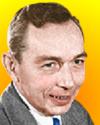 | "The late Alan Gregg pointed out that human population growth within the ecosystem was closely analogous to the growth of malignant tumor cells within an organism: that man was acting like a cancer on the biosphere. The multiplication of human numbers certainly seems wild and uncontrolled... Four million a month - the equivalent of the population of Chicago... We seem to be doing all right at the moment; but if you could ask cancer cells, I suspect they would think they were doing fine. But when the organism dies, so do they; and for our own, selfish, practical, utilitarian reasons, I think we should be careful about how we influence the rest of the ecosystem." |
 | "First were mainframes, each shared by lots of people. Now we are in the personal computing era, person and machine staring uneasily at each other across the desktop. Next comes ubiquitous computing, or the age of calm technology, when technology recedes into the background of our lives." |
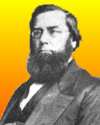 | "Sight is a faculty; seeing, an art." |
| QUIZ | |
| Before you look at today's web page, see if you can answer some of these questions about the events that happened on this day. Some of the names are very familiar. Others will likely stump you. Tickle your curiosity with these questions, then check your answers on today's web page. | |
| Births | |
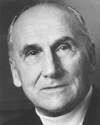 |  Vladimir Prelog, born 23 Jul 1906, was a Yugoslavian-born Swiss chemist who shared the 1975 Nobel Prize for Chemistry with John W. Cornforth for his work on the stereochemistry of organic molecules and reactions. By X-ray diffraction, he elucidated the structure of several antibiotics. Vladimir Prelog, born 23 Jul 1906, was a Yugoslavian-born Swiss chemist who shared the 1975 Nobel Prize for Chemistry with John W. Cornforth for his work on the stereochemistry of organic molecules and reactions. By X-ray diffraction, he elucidated the structure of several antibiotics. What is stereochemistry? What is stereochemistry? |
| |  Theodore Schneirla, born 23 Jul 1902, was the foremost American comparative psychologist of the mid-1900's. He went so far in his "biphasic A-W theory" as to reduce all behavior to two simple responses: approach and withdrawal. We approach what causes pleasure, and we withdraw from what causes unpleasure or pain. Theodore Schneirla, born 23 Jul 1902, was the foremost American comparative psychologist of the mid-1900's. He went so far in his "biphasic A-W theory" as to reduce all behavior to two simple responses: approach and withdrawal. We approach what causes pleasure, and we withdraw from what causes unpleasure or pain. His empirical work was based on the behaviour patterns of which animal? His empirical work was based on the behaviour patterns of which animal? |
| Deaths | |
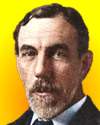 |  Sir William Ramsay (1852-1916) was a Scottish chemist who was a Nobel laureate (1904) “in recognition of his services in the discovery of the inert gaseous elements in air, and his determination of their place in the periodic system.” Sir William Ramsay (1852-1916) was a Scottish chemist who was a Nobel laureate (1904) “in recognition of his services in the discovery of the inert gaseous elements in air, and his determination of their place in the periodic system.” Can you name five of these "inert" gases that he discovered? Can you name five of these "inert" gases that he discovered? |
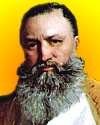 |  Isaac Merrit Singer (1811-1875) was the inventor of the continuous-stitch sewing machine in 1851. Singer was an itinerant machinist until 1851 when he designed an effective sewing machine using the basic features found on modern machines. A patent infringement settled with Elias Howe, another sewing machine inventor, did nothing to deter Singer. The company he founded was, within the decade, the world's largest sewing machine manufacturer. Singer gained 20 additional patents, but his biggest invention was the new way of marketing to consumers. He spent millions of dollars on advertising, made purchase affordable by offering installment credit, and provided after-sale service. Isaac Merrit Singer (1811-1875) was the inventor of the continuous-stitch sewing machine in 1851. Singer was an itinerant machinist until 1851 when he designed an effective sewing machine using the basic features found on modern machines. A patent infringement settled with Elias Howe, another sewing machine inventor, did nothing to deter Singer. The company he founded was, within the decade, the world's largest sewing machine manufacturer. Singer gained 20 additional patents, but his biggest invention was the new way of marketing to consumers. He spent millions of dollars on advertising, made purchase affordable by offering installment credit, and provided after-sale service.  What was Singer's nationality? What was Singer's nationality? |
| Events | |
 On 23 Jul 1937, the isolation of pituitary hormone was announced (Yale University). It is the master endocrine gland in vertebrate animals. The hormones secreted by the pituitary stimulate and control the functioning of almost all the other endocrine glands in the body. Pituitary hormones also promote growth and control the water balance of the body. On 23 Jul 1937, the isolation of pituitary hormone was announced (Yale University). It is the master endocrine gland in vertebrate animals. The hormones secreted by the pituitary stimulate and control the functioning of almost all the other endocrine glands in the body. Pituitary hormones also promote growth and control the water balance of the body. Where in the body is the pituitary gland found? Where in the body is the pituitary gland found? | |
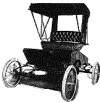 |  On 23 Jul 1903, in Detroit, the Ford Motor Company sold its first automobile. The Ford Model A featured an internal combustion engine designed and manufactured by a little-known Michigan machinist, Henry Ford. On 23 Jul 1903, in Detroit, the Ford Motor Company sold its first automobile. The Ford Model A featured an internal combustion engine designed and manufactured by a little-known Michigan machinist, Henry Ford.  How many cylinders were in the engine? How many cylinders were in the engine? |
| Answers |
When you have your answers ready to all the questions above, you'll find all the information to check them, and more, on the July 23 web page of Today in Science History. Or, try this link first for just the brief answers. Fast answers for the previous newsletter for July 22: Being of Jewish descent, he was forced to resign when Hitler took power; Gregor Mendel; he invented the “continuous wave”: sound superimposed onto a radio wave for transmission; Brooklyn and Niagara River Bridges; Shoemaker-Levy; 11 years old. |
| Feedback |
 If you enjoy this newsletter, the website, or wish to offer encouragement or ideas, please send feedback by using your mail reader Reply button. If you enjoy this newsletter, the website, or wish to offer encouragement or ideas, please send feedback by using your mail reader Reply button. |
--
If you do not want to receive any more newsletters, this link
To update your preferences and to unsubscribe visit this link
If you do not want to receive any more newsletters, this link
To update your preferences and to unsubscribe visit this link
! !



Δεν υπάρχουν σχόλια:
Δημοσίευση σχολίου